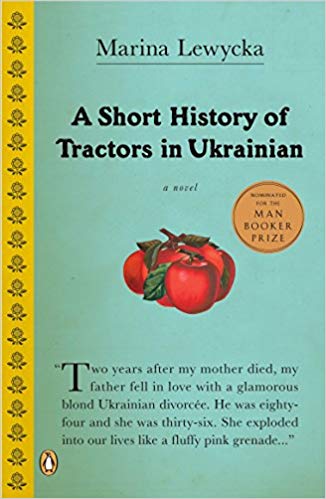
A Short History of Tractors in Ukrainian, by Marina Lewychka, Penguin, 2005.
If Helen Fielding, author of Bridget Jones Diary, were an elder–care worker, this might be the sort of novel she would write. Much of this book is written with a light, almost breezy, touch. Two middle–aged sisters with families of their own are suddenly faced with the challenge of an aging father who is determined to marry a thirty–something woman from his native Ukraine. While it is obvious to the daughters that their mother’s replacement is a gold–digger seeking a marriage of convenience, their father insists that it is love, and even if not love, the woman and her genius son deserve all the opportunities of a new life in the UK (including breast implants). Over his daughters’ protests, he marries, and the balance of the novel tells how the sisters draw together as they conspire to put an end to the marriage.
Notwithstanding the light touch, there are a couple of darker strands woven into the story. There is the history of the tractor. This is the father’s project: a book tracing the rise of the tractor and its impact upon the people it variously serves and enslaves. The manufacture of the tractor is meant to ease the lives of the farmer and bring more food to the working classes. But tractor designs get incorporated into tanks, and farming efficiencies displace people.
There is also the more personal strand. The two sisters are ten years apart, one born during the war, the other born in peacetime. The younger, Nadia, knows little of the important stories—the stories that account for her father’s eccentricities and explain the more troubling ways her parents related to one another. Nadia needs her father and her older sister. Notwithstanding her feelings of frustration, she can’t afford to alienate them or she will lose vital parts of her own story.
In sum, a nice mix of humour and darker themes to produce a work that is entertaining without sacrificing depth.
My Rating: *** (3 out of 5)